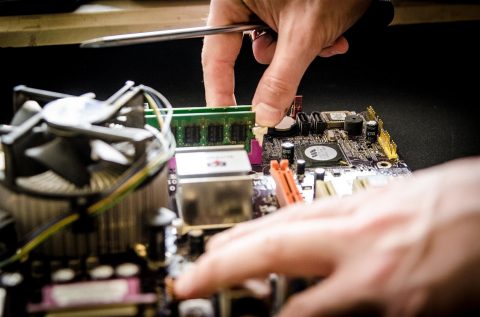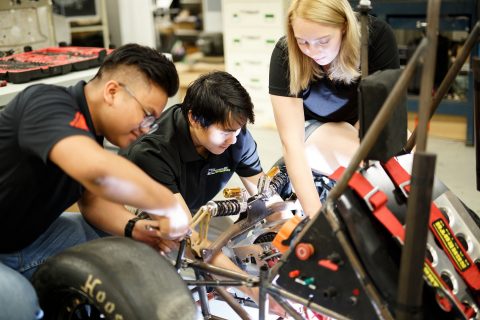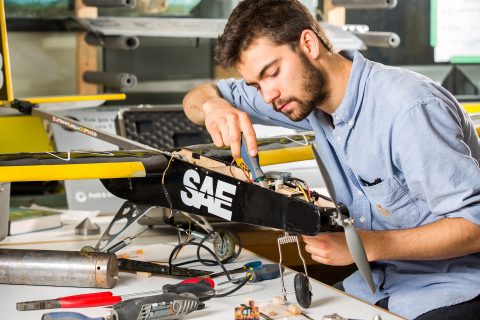Electrical Engineering (BEng)
Virtual information sessions
Want to know how we're training the next generation of engineers and computer scientists? Join us to learn about the Gina Cody School's undergraduate programs and plans to advance integrated technologies in a socially responsible manner.
Why study Electrical Engineering?
Control energy with a flip of a switch. Design next-generation microchips or flight control systems. Electrical engineers build electrical and electronic devices and systems that we depend on every day — whether they are very small (like the microchips in our cell phones) or very large (like the power grids or charging stations for electric cars).
Our state-of-the-art labs for digital electronics, electric power systems, microfabrication, circuits and digital communications will give you experience with the tools you’ll use in the field. Through labs, lectures and projects, you’ll also:
- Design circuits and electronics systems
- Study, design and fabricate micro devices
- Design communications systems (protocols, antennas, channel modulation, networks)
- Design power electronics for renewable energy and electric transportation
- Learn signal processing techniques for analysis of bio medical signals
- Design control systems for airplanes and other vehicles
- Work in a Co-op program and get real-world experience in the microelectronics, telecommunications and power industries
All of our Engineering programs are accredited by the Canadian Engineering Accreditation Board and you’ll graduate eligible to become a registered professional engineer.
Program highlights
- Concordia’s chapter of the IEEE student society offers guidance on electronics projects from soldering tutorials to PCB design in their fully equipped lab, as well as hosting social and networking events.
Special funding for out-of-province students
Up to $4000 for undergraduate programs.
Program structure
The Bachelor of Engineering in Electrical Engineering takes a minimum of four to five years (120 – 150 credits) of full-time study, depending on your academic background.
All students accepted in the Electrical Engineering (BEng) program who are not enrolled in the Co-op program must complete one 12-17-week internship to graduate. This internship program, C.Edge, is administered by the Institute of Co-operative Education and will allow ECE students to have one paid internship in their field of study.
Electrical Engineering program includes the following:
- Engineering core courses
- Electrical Engineering core courses
- Elective courses
Integrated path
Get a head start on graduate studies. As an undergraduate student in Electrical Engineering, you can take up to 16 credits that count towards both your Bachelor of Engineering and a Master of Engineering (MEng) in Electrical and Computer Engineering, Information Systems Security and Quality Systems Engineering.
Courses
Course sequences
Sample Capstone projects
- Build an FM wireless receiver
- Build a “smart home” using sensor technology
- Design a solar home electric vehicle charger
- Develop a wind energy conversion system
Co-op program
The Co-op program gives you the chance to complete paid work terms that last 12 to 16 weeks. As a Co-op student, you will work for engineering firms where you may:
- Design and code embedded systems
- Develop, test and integrate telecom solutions
- Design and validate a video card’s programmable circuits
Career Edge internship
Students not enrolled in Co-op will complete a C.Edge internship as part of their degree requirements. This full-time paid internship lasts between 12-17 weeks, and enables students to:
- Strategically develop their career while earning an income
- Get support finding an internship in their field
- Apply their academic skills in a real-world work environment
- Take advantage of networking and mentoring opportunities
- Develop important personal and professional skills
Admission criteria
Minimum cut-off averages and course requirements
- Quebec CEGEP: 24 overall, 25 math, 25 physics
- Admission is based on applicants’ overall, math and physics CRC indicated above and completion of the following classes as part of their DEC: General Chemistry 1; Calculus 1 and Calculus 2 and Linear Algebra; Mechanics and Electricity and Magnetism.
- Students completing one of the eligible technical DECs may qualify for admission without the listed prerequisites. However, if the prerequisites are taken, a minimum of 25 in math and a 25 in physics are required.
- Eligible technical DECs include 244.A0, 243.D0, 243.C0, 243.B0, 243.F0
- Advanced standing may be possible
- Additional information for CEGEP applicants
- High school: C+ overall, B in math, B in physics
- One math from Pre-Calculus, Calculus, or equivalent
- Grade 12 or university-preparatory physics
- Canadian curricula course requirements
- Accepted international qualifications
- ACT or SAT is not required
- AP exams are not required but may qualify you for advanced standing
- Indigenous Bridging Program: First Nations, Inuit and Métis students who do not meet Concordia’s conventional admission requirements may be eligible for admission through the Kaié:ri Nikawerá:ke Indigenous Bridging Program
- International Baccalaureate (IB) diploma: 26 overall, 4 HL or 5 SL math, 5 physics
- one math (Applications and Interpretations HL, Analysis and Approaches HL or Analysis and Approaches SL)
- one of the math or physics courses must be completed at the HL level
- International Baccalaureate Career-related Programme (CP): 4.8/7 overall, 4 HL or 5 SL math, 5 HL or SL physics
- one math (Applications and Interpretations HL, Analysis and Approaches HL or Analysis and Approaches SL)
- one of the math or physics courses must be completed at the HL level
- Additional Career-related Programme (CP) course requirements
- Baccalauréat français: 11 overall, 13 in math, 13 in Spécialité physique-chimie
- Required courses:
- Première: Spécialité mathématiques and Spécialité physique-chimie
- Terminale: Spécialité mathématiques (also accepted, Spécialité Physique-Chimie and Mathématiques Complémentaires)
- Additional information for Baccalauréat français applicants
- Required courses:
- British system of education (GCE):
- A-levels: At least two A-level exams BB, B in math, B in physics or
- AS-levels: At least 4 AS-level exams with equivalent results or
- BTEC: Level 3 Diploma or Extended Diploma in a related subject area with equivalent results
- Students without math or physics A-levels may be admissible based on AS-level or iGCSE/GCSE/O-Level exam results. Students should include all their exam results from iGCSE (or equivalent) onwards to support their application.
- Additional information for British System of Education (GCE) applicants
- University transfer (internal): 2.5 overall, 2.7 in math/physics, 1.7 in courses offered by the Gina Cody School of Engineering and Computer Science
- At least two of the following (or equivalent): MATH 203, 204, 205
- PHYS 204 or 205 (or equivalent)
- University transfer (external): B- overall, B in math, B in physics
- Courses in the disciplines of Calculus, Chemistry and Physics
Minimum cut-off averages should be used as indicators. The cut-off data may change depending on the applicant pool. Applicants who meet the stated minimum requirements are not guaranteed admission to these programs.
Application deadlines

FALL ENTRY (September)
Deadline: March 1
U.S. and international applicants: Apply no later than February 1 to allow time for immigration document processing. However, applying earlier is strongly recommended. Immigration processing times vary by country and delays could prevent you from starting your studies on time.

WINTER ENTRY (January)
Deadline: November 1
U.S. and international applicants: Apply no later than August 1 to allow time for immigration document processing. However, applying earlier is strongly recommended. Immigration processing times vary by country and delays could prevent you from starting your studies on time.
We reserve the right to close admission to a program at any time after the official deadline without prior notice.
Funding note
United States students: A U.S. Federal Student Aid-eligible version of this program is offered. This version meets all U.S. regulations (such as no co-operative education or e-courses) for eligible programs.
After your degree
Electrical Engineering alumni have established careers in a range of fields, including aerospace, avionics and robotics, telecommunications, image and video processing, digital security, and power electronics and systems. Some have been hired by:
- Bombardier
- CAE Inc.
- Ericsson
- Hydro-Quebec
- CAE Inc.
Student story

Gabriel Dubé
Bachelor of Engineering Option: Electrical Engineering
Before graduating from Electrical Engineering, Gabriel Dubé launched a career in the space industry and several satellites into the atmosphere.

Liliane Nguemtchouang
Bachelor of Engineering Option: Electrical Engineering
Being a student is difficult sometimes, but I love being at Concordia. People are so friendly and it’s so easy to make friends here.
Other programs of interest

Without computer hardware there would be no smart phones, DVD players and digital recorders or computerized medical devices. As a computer engineer, your knowledge of computer architecture, digital electronics, circuits and digital communication will lead to new innovations or bring about another information revolution.
Department
Department of Electrical and Computer Engineering
Faculty

Build engines. Design robots. Control explosions. As a mechanical engineer, you will create, construct and control machines. Whether it’s a vehicle, an aircraft engine or an assembly line, mechanical engineers know how to fit that square peg into a round hole, and do it with a little finesse.
Department
Department of Mechanical, Industrial and Aerospace Engineering
Faculty


